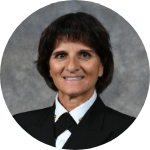
CPSE President Mary Cameli, CFO
CPSE Corner recently sat down with the CPSE’s new President Mary Cameli, CFO, who is the Fire Chief of Mesa Fire and Medical in Arizona, to learn more about her career and thoughts on the future of CPSE.
CPSE Corner: What was your path to becoming fire chief of Mesa Fire and Medical?
Chief Cameli: I was hired in 1983, myself and another female, and we were the first two hired on the department. I actually moved out to Arizona to teach school; I had never thought about this as a career. But I had a brother on the department and he was telling me about the job. The more he told me, the more I thought that this fits my personality. I tested in ’82, got hired in ’83, and haven’t looked back since. I moved up through the ranks to engineer, captain, battalion chief, assistant chief and then became fire chief six years ago.
CPSE Corner: What different parts of the fire department did you work in during this time?
Chief Cameli: I started in Operations, then I was assigned to Training. Once I was promoted to battalion chief I returned to Operations for a while before serving as PIO for about five years. From there, I became assistant chief and over the years I supervised a number of different divisions…Training, EMS, Public Education, Special Teams, and Planning and Research (which is responsible for Accreditation).
CPSE Corner: What has been your experience with CPSE prior to joining the Board?
Chief Cameli: Back in 2002, the then Fire Chief of Mesa, Dennis Compton, started telling us about Accreditation, through the Commission on Fire Accreditation International. I was not the accreditation manager at the time, but I saw the benefits of it, having someone come in and look at your department and how you learn so much. You think you pretty much know everything already, but when someone comes in and gives you suggestions…that’s priceless.
CPSE Corner: So what do you see as the value of Accreditation, if one of your peers asked you why they should pursue accreditation for their department, what would you say?
Chief Cameli: We get very comfortable in our processes; we take things for granted. It’s always good to have another set of eyes outside of your organization looking at what you are doing. They will come up with things that you don’t even see or don’t recognize. There is a perfect example from our site visit last year. It was our fifth time through and the team brought to our attention that our ordinance in the City Charter was extremely dated. So, we brought it forward to the City Council and had it changed to reflect all of the things we do now, such as EMS, transport, social services and changed our name to include the word “Medical.”
CPSE Corner: You also hold a designation from the Commission on Professional Credentialing (CPC). How would you explain the value of that process to your peers?
Chief Cameli: Getting my CFO (Chief Fire Officer designation) was something that was so helpful to me in my career. By putting things on paper, it helps make you accountable and makes sure you are engaged in your community. It is not only a great way to keep track of where you have been but also to make sure you aren’t getting stagnant, but that we are serving our community. I’m proud to be one of the 3,000 CPC designees.
CPSE Corner: Mesa Fire was featured in the CPSE ICMA 21st Century White Paper as a department embodying re-identification. I’m sure you have seen a lot of change in your 40-year career, how is the fire service changing?
Chief Cameli: I sure have seen a lot of change, and we just keep getting better and better. I think it is so important to stay flexible to meet the needs of your department. For almost 50 years we have been involved in the medical business, and that’s when one of my predecessors, Chief Harry Beck, put that word “Medical” in our name because that is 80% of what we do. So many times, we would show up on a heart attack call and people would say they did not call the fire department, I called for medics. Well, when you call Mesa Fire and Medical, that’s what you are getting, two paramedics and two EMTs on every truck.
And when you talk about re-identification, years ago we would never have thought to have a social services division. We now have a whole division where we have social service workers that help on the calls where our crews find people struggling or need help. We are able to connect them with the resources they need.
We also focus on the high users of the system. For example, if someone keeps falling, we can connect them to the resources they need. We can also set up times in areas with high calls to go in and install pull bars in homes. We literally take a day to go in and install these bars.
CPSE Corner: In addition to keeping the community safer, does this also translate into fire fighter safety?
Chief Cameli: Absolutely. Anytime we can prevent someone from calling 911, that’s one less time the firefighters are on the road. We’re busy, they are on the road all the time. Preventing calls from happening is an important part of our business too.
CPSE Corner: Back to CPSE, what are some of the current Board priorities from the Strategic Plan?
Chief Cameli: We’re working on quite a few different areas. Diversity, equity, and inclusion (DEI) is very important to us as an organization because we know it resonates throughout the fire service. We want to make sure the Board is getting training on DEI on a regular basis because what we do (at CPSE) resonates out to the fire service.
Brand awareness is another area we are working on. When someone sees the brand “CPSE” we want them to know that there are quality programs behind that name. That we high expectations for our ourselves and our agencies and officers. And that, we strive to be best in class in our governance, operations, and programs. Just like DEI, it’s important and it starts with us, the Board, because we are the ones that are going to set the standard. It’s one thing to talk the talk, but we are also going to walk the walk.
Greater and broader engagement and collaboration is a big priority for the Board. We want to actively engage with our agencies/officers to meet their needs and collaborate with the many important fire service organizations that are equally focused on supporting the fire service.
CPSE Corner: As President, what are some of your goals for the CPSE Board?
Chief Cameli: I have to say that I really feel like CPSE is on a great track. We have a great CEO who is very engaged and is always seeking out better ways to do things and is very open to suggestions from the Board. I want to make sure that people are all about sharing new ideas, coming up with new ones and being innovative. How do we meet people’s needs?
I want us to be thinking of ways that we can reach more and more fire departments across the country to help them be the best that they can be. Whether you are in Arizona, Illinois, or Maine, we all represent each other wherever we go, people look at the fire service as one big family. CPSE is trying to make the fire service overall a better place for everyone and meeting the needs of our communities.
CPSE Corner: What are some of the challenges that you think fire departments are currently facing?
Chief Cameli: I think that we’re not getting as many people interested in making the fire service a career as we used to. Funding is always an issue, but keeping firefighters is an important one. There are a lot of times that we are not seeing people make this a 25 or 30-year career, as the new generation doesn’t necessarily think that way. So, I think that sustainability in terms of getting people to continuously want to be a part of this profession is a big challenge.
Succession planning goes along with this because we have a lot of people retiring and a lot of new people coming in.
Firefighter safety is critical, and we need to ensure that we have high-quality training for them. And another part of firefighter safety is the high risk of cancer. We have a lot of presumptive cancers out there, and it makes people think twice about coming into this profession, so we must do all we can to minimize these risks. And this leads us to how we are building our stations differently, how we do decon on the fire scene, and how we change out our turnouts. There are just a lot of operational practices that are different now.
Mental health is another challenge in the fire service. For a number of years, we didn’t have peer support, but hopefully firefighters are getting more comfortable about seeking help if they need it. Years ago, it was unheard of, but now they are more willing to reach out and say, “Hey, I need to talk with somebody, I need some help,” and I’m very proud of them for doing that.
CPSE Corner: What excites you most about volunteering with CPSE?
Chief Cameli: I have to say, first, that I believe in the process, I absolutely believe in the Accreditation and Credentialing processes. It’s an honor to be a part of such a great group of people that have the same passion and that understand the value and importance of doing this. I just feel like we’re on a great path and to be a part of this organization that’s bigger than me and help to move it forward, I’m very proud to be a part of that group. We all have the same vision, and the same passion, and it’s an honor to be a part of it.
CPSE Corner: There have been some recent changes in the CPSE Board, could you share a little about those?
Chief Cameli: Jeff Pomeranz just stepped down after completing his term on the Board and serving the past two years as President. He was CPSE’s first President who was a city manager and brought a great perspective to the position. In addition, two other Board members stepped down at the end of 2022, Terry Ford (CFO) and Tom Harmer. They had great insights that we’ll miss. We wish them well in their retirement.
Three new Board Members joined us at the beginning of 2023: Derek Bergsten (CFO, CEMSO, CTO, PIO) Alec Oughton (CFO), and Melissa Stevenson Diaz. They join an existing group of board members committed to governance excellence and CPSE’s core values: Progressive Leadership, Outcomes, and Continuous Improvement.
CPSE Corner: Anything else in closing you would like to add?
Chief Cameli: Yes, I have an open door if you have any suggestions or ideas. I’m always willing to listen. I think that we have a great team that’s ready to do whatever it is we need to do to keep CPSE at the forefront, and I’m here for anyone who has any questions, concerns, or ideas on how we can do that!
